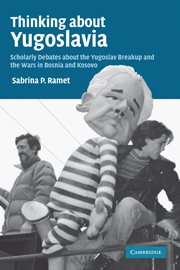 Thinking about Yugoslavia
Thinking about Yugoslavia Book contents
- Frontmatter
- Contents
- Preface
- List of books discussed
- Glossary
- 1 Debates about the war
- 2 The collapse of East European communism
- 3 The roots of the Yugoslav collapse
- 4 Who's to blame, and for what? Rival accounts of the war
- 5 Memoirs and autobiographies
- 6 The scourge of nationalism and the quest for harmony
- 7 Milošević's place in history
- 8 Dilemmas in post-Dayton Bosnia
- 9 Crisis in Kosovo/a (with Angelo Georgakis)
- 10 Debates about intervention
- 11 Lands and peoples: Bosnia, Croatia, Slovenia, Serbia
- 12 Southern republics: Macedonia and Montenegro in contemporary history
- 13 Conclusion: controversies, methodological disputes, and suggested reading
- Index
- References
12 - Southern republics: Macedonia and Montenegro in contemporary history
Published online by Cambridge University Press: 22 September 2009
- Frontmatter
- Contents
- Preface
- List of books discussed
- Glossary
- 1 Debates about the war
- 2 The collapse of East European communism
- 3 The roots of the Yugoslav collapse
- 4 Who's to blame, and for what? Rival accounts of the war
- 5 Memoirs and autobiographies
- 6 The scourge of nationalism and the quest for harmony
- 7 Milošević's place in history
- 8 Dilemmas in post-Dayton Bosnia
- 9 Crisis in Kosovo/a (with Angelo Georgakis)
- 10 Debates about intervention
- 11 Lands and peoples: Bosnia, Croatia, Slovenia, Serbia
- 12 Southern republics: Macedonia and Montenegro in contemporary history
- 13 Conclusion: controversies, methodological disputes, and suggested reading
- Index
- References
Summary
There are certain nationalities in Europe that remain the subject of controversy even today. Chief among these are the Ruthenes (said by many, but not by all, to be really Ukrainians), the Silesians (whose purportedly distinct ethnicity has found little acknowledgement), the Vlachs (variously alleged to be a distinct national group or merely Romanians living in Serbia or perhaps even Romanianized Serbs), the Montenegrins (said by many, including many but not all Montenegrins, to be really Serbs), and the Macedonians (described variously as ‘South Serbs’, as ‘Slavophone Greeks’, as western Bulgarians, and, of course, as a distinct nationality). And where the Macedonians are concerned, disputes about their identity are connected with the state interests of Macedonia's neighbours.
Hugh Poulton derives the title of his Who Are the Macedonians? from precisely this still-unresolved controversy. As Poulton notes, there are (at least) three rival ways of identifying ‘Macedonians’: the first refers to all the inhabitants of what is often called ‘geographic Macedonia’, comprising not only the Republic of Macedonia but also part of northern Greece, a portion of southwest Bulgaria, and a sliver of Albania; the second refers to all citizens of the Republic of Macedonia; and the third refers to the Slav population living within either of the former two areas, i.e., to ethnic Macedonians. As he notes, the Slavs arrived in the Balkans only in the sixth century CE and, in 864, the ‘Proto-Bulgarians’ (including the ancestors of present-day Macedonians) converted en masse to Christianity.
- Type
- Chapter
- Information
- Thinking about YugoslaviaScholarly Debates about the Yugoslav Breakup and the Wars in Bosnia and Kosovo, pp. 280 - 304Publisher: Cambridge University PressPrint publication year: 2005


